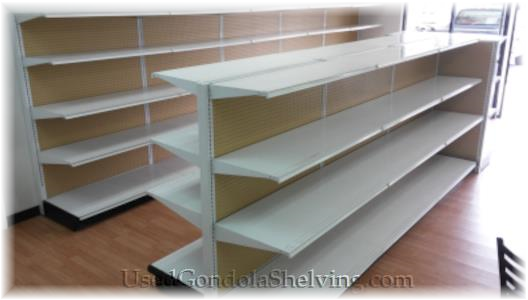Liquidation Sale Buying Tips:
•Be prepared to work! Liquidations are often selling fixtures where they sit. That means when you make a purchase, you are responsible for removing it from the building.
Dismantling and packing 100 linear feet of shelving can be very labor intensive. Be prepared with a work crew, pallets, shrink wrap, banding and a truck, or you might be in for a nightmare.
•Wait until the last minute! Liquidators often have a contractual obligation to clean out the building. If they have to be "broom swept" soon, and the store is full of fixtures, they will usually lower their prices. They don't want to get stuck paying for labor and shipping if they can sell out without touching the shelving.
•Don't wait until the last minute! (Yes, this contradicts our last buying tip) If you need 22" inch shelves, and the store being liquidated only has 32 linear feet available , and the rest is 16", you might consider buying now, before someone else does. Liquidators love to say, "Buy it now, before it's gone!"...they might want to scare you into an impulse purchase, but sometimes it is just good, sound advice.
•Haggle. Store fixture liquidation prices are rarely set in stone. Usually the liquidator has a little, or a lot, of breathing room when it comes to pricing the fixtures.
Ask about price breaks and quantity discounts.
Throw an offer out there. It might work.
If you notice they have a huge quantity of the some hard-to-sell-niche-product (30" tall green shelving, maybe), try to set your own price.
•Try catching flies with honey. Remeber, the fixture seller often has control of the terms and prices of the sale. If you are a pain in the butt, there might be "special" prices, just for you! The process of buying used shelving can be logistically difficult. If you are easy to deal and communicate with, the store fixture liquidator is in a position to reciprocate your kind nature with: better pricing on additional purchases; extra time in store or at a dock; use of equipment or staff.
•Know and understand all of the terms of sale. Make sure you understand all of the terms of the sale.
-Removal Date - When do you have to pick it up by? Hours of operation?
-Equipment use - Can you use the liquidators loading docks, forklift, pallet jacks, pallets, and other things you might take for granted until it is too late? Remember, removal is your problem, not the liquidators.
-Prices - Often sales will have a "buyers premium". This is usually the fee that a liquidator or auctioneer will charge...it's thier cut and a common practice. It isn't subject to state sales tax, I believe.
-Tax - Yes, you will be charged state sales tax. Write your congressperson.

